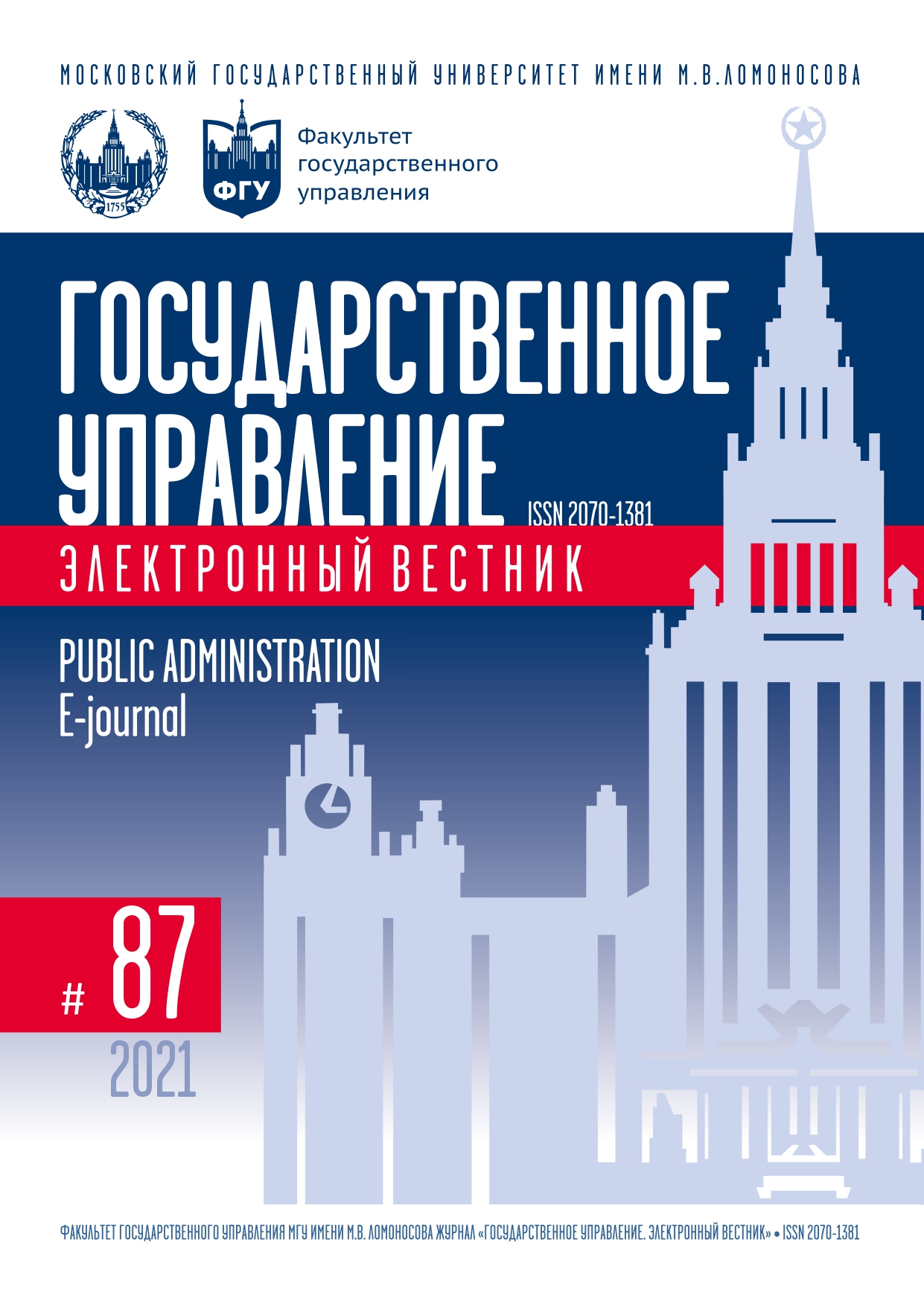Youth Political Leadership in Institutional Dimension: Shaping Environment andDevelopment Features
Keywords:
Youth policy, youth, civic consciousness, citizenship, political socialization, civic-patriotic educationAbstract
Youth policy is an actively developing area of state policy in modern Russia. One of the directions of its implementation, enshrined in the recently adopted Law “On youth policy in the Russian Federation”, is the education of citizenship. This determines the need for a scientific understanding of youth policy implementing in our country in the context of the political socialization of youth and the formation of its civic consciousness. The purpose of the research presented in this article is to identify the problems and contradictions of the socialization influence of youth policy on the development of youth in the spirit of civic consciousness and patriotism based on the analysis of the characteristics of youth perception of youth policy. The conceptual and methodological basis of the study is the political and psychological approach, within which youth is viewed as a subject of socio-political processes, and youth policy as a factor in its political socialization. The empirical base of the study contains materials from 200 in-depth interviews conducted with young Russian citizens aged 18 to 30 years in 2020, as well as materials from 20 expert interviews conducted in 2020–21 with research scientists and youth workers. The results of the study show that in the minds of the respondents there are no clear and meaningful ideas about what youth policy is, what its goals and areas of activity are. On the one hand, young people mostly negatively characterize this policy, consider it insufficiently effective and think that it does not take into account the needs and interests of young people. On the other hand, representatives of the younger generation note the importance of youth policy and the need to build a constructive dialogue between youth and the state. The perception of youth policy is influenced by the youth negative attitude towards the state and the low level of trust to the authorities in general. Problematic issues that affect the quality of political socialization of youth by means of youth policy are difficulties in informing target audiences about programs and projects for youth, lack of citizenship models among young people themselves, insufficient historical, political and communicative competence of specialists working with youth, as well as substantive, organizational and technological mistakes in the field of civic and patriotic education. These problems significantly reduce the effectiveness of work on the formation of young people civic consciousness.
References
Андрюшина Е.В. Государственная молодежная политика в российском обществе: этапы, основные направления, показатели результативности // Государственное управление. Электронный вестник. 2018. № 67. С. 269–281. DOI: 10.24411/2070-1381-2018-00027.
Андрюшина Е.В., Панова Е.А. Современная российская государственная молодежная политика: эволюция, основные направления, практики // Власть. 2017. Т. 25. № 7. С. 60–65.
Власть и лидеры в восприятии российских граждан. Четверть века наблюдений (1993–2018) / Отв. ред. книги Е.Б. Шестопал. М.: Издательство Весь Мир, 2019.
Государственная молодежная политика в России: социально-психологические основания и технологии реализации / Под общей редакцией С.Ю. Поповой. М.: Аквилон, 2019.
Дейч Б.А. Государственная молодежная политика и воспитание молодежи: динамика содержания и проблем // ЦИТИСЭ. 2018. № 1. URL: http://ma123.ru/ru/2018/03/государственная-молодежная политик-3/
Задонская И.А. Роль молодежной политики в формировании ценностных ориентаций современной молодежи // Вестник тамбовского университета. Серия Общественные науки. 2016. Т. 2. Вып. 2. С. 28–33.
Зубок Ю.А. Молодежь: жизненные стратегии в новой реальности // Мониторинг общественного мнения: экономические и социальные перемены. 2020. № 3(157). С. 4–12. DOI: 10.14515/monitoring.2020.3.1688.
Камалова М.И., Соловьев А.И. Государственная молодежная политика: проблемы и траектории развития в современной России // Государственное управление. Электронный вестник. 2020. № 83. С. 62–83. DOI: 10.24411/2070-1381-2020-10109.
Коряковцева О.А., Климов О.А. Государственная молодежная политика в современной России: развитие гражданской активности молодежи // Вестник Костромского государственного университета им. Н.А. Некрасова. 2013. № 2. С. 170–173.
Политическая социализация российских граждан в период трансформации / Под ред. Е.Б. Шестопал. М.: Некоммерческое партнерство “Новый хронограф», 2008.
Попова О.В., Негров Е.О. Молодежная политика глазами самой молодежи: проблема в PR? // Среднерусский вестник общественных наук. 2019. Т. 14. № 6. С. 37–58. DOI: 10.22394/2071-2367-2019-14-6-37-58.
Радаев В. Миллениалы: Как меняется российское общество. М.: Изд. дом Высшей школы экономики, 2019.
Самсонова Т.Н. О становлении политической субъектности российской молодежи в процессе политической социализации // Общество: социология, психология, педагогика. 2018. № 7(51). С. 18–24. DOI: 10.24158/spp.2018.7.2.
Самсонова Т.Н., Зиненко В.Е. Формирование политической субъектности молодежи в современной России: критерии, условия, проблемы // Общество: политика, экономика, право. 2021. № 3(92). С. 17–24. DOI: 10.24158/pep.2021.3.2.
Самсонова Т.Н., Наумова Е.С. Роль СМИ в политической социализации современной российской молодежи // Вестник Московского университета. Серия 18. Социология и политология. 2019. Т. 25. № 4. С. 247–264. DOI: 10.24290/1029-3736-2019-25-4-247-264.
Селезнева А.В., Азарнова А.А. «Рождение гражданина»: политико-психологический анализ гражданственности российских старшеклассников // Полис. Политические исследования. 2020a. № 5. С. 101–113. DOI: https://doi.org/10.17976/jpps/2020.05.08.
Селезнева А.В., Азарнова А.А. Гражданин как политико-психологический феномен: концептуальный анализ // Вестник Московского университета. Серия 12: Политические науки. 2020b. № 4. С. 7–23.
Селезнева А.В., Антонов Д.Е. Ценностные основания гражданского самосознания российской молодежи // Вестник Томского государственного университета. Философия. Социология. Политология. 2020. № 58. С. 227–241. DOI: 10.17223/1998863X/58/21.
Селезнева А.В., Смулькина Н.В., Яковлева А.Ф. Образ России в структуре гражданского самосознания молодежи: визуальное измерение // ΠΡΑΞΗΜΑ. Проблемы визуальной семиотики. 2021. № 2(28). С. 110–129. DOI: 10.23951/2312-7899-2021-2-110-129.
Чуев С.В., Поляков М.Б. Основные проблемы развития сферы государственной молодежной политики // PolitBook. 2017. № 3. С. 45–63.
Oosterhoff B., Ferris K.A., Metzger A. Adolescents’ Sociopolitical Values in the Context of Organized Activity Involvement // Youth & Society. 2017. Vol. 49(7). P. 947–967. DOI: https://doi.org/10.1177/0044118X14560528.
Van Deth J.W., Abendschon S., Vollmar M. Children and Politics: An Empirical Reassessment of Early Political Socialization // Political Psychology. 2011. Vol. 32. No. 1. P. 147–174. DOI: https://doi.org/10.1111/j.1467-9221.2010.00798.x.
Verhaegen S., Boonen J. The Development of Political Knowledge in Adolescence: The Importance of Information-Rich Socialization Contexts // Politics, Culture and Socialization. 2016. Vol. 7. No. 1-2. Р. 7–27. DOI: https://doi.org/10.3224/pcs.v7i1-2.01.

